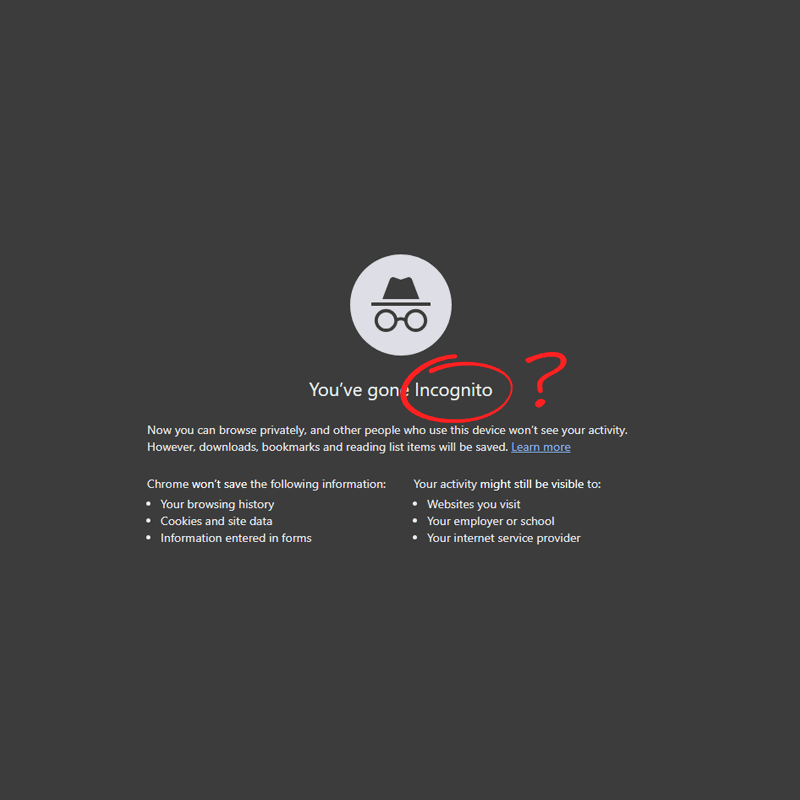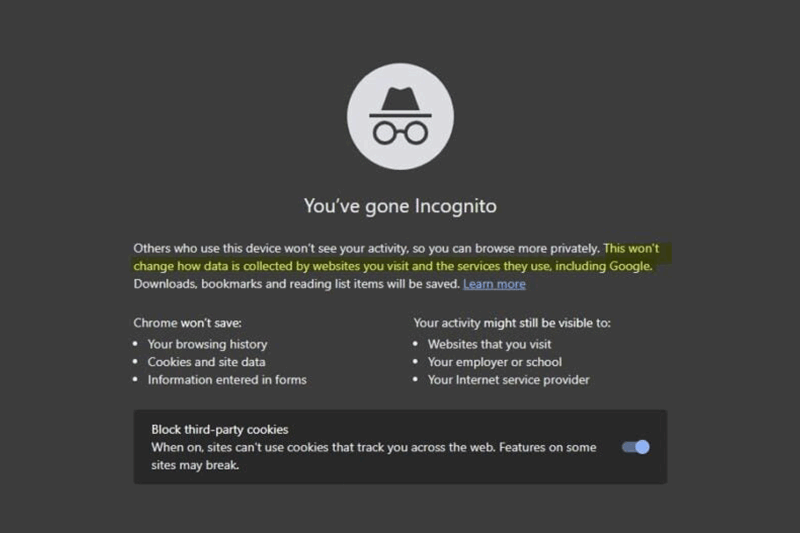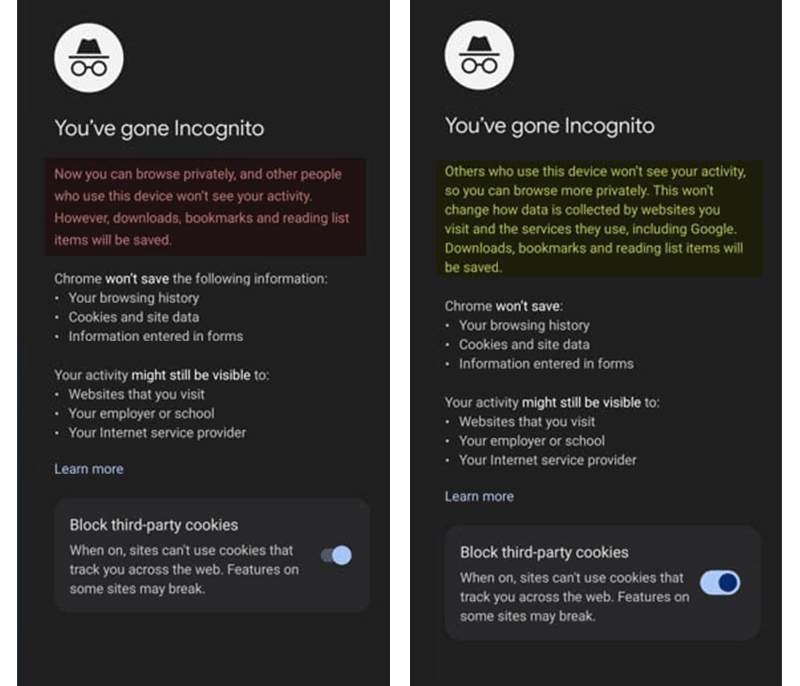
"You’ve gone Incognito," Google Chrome says, when the Incognito mode is on.
"Now you can browse privately, and other people who use this device won’t see your activity. However, downloads, bookmarks and reading list items will be saved," adding that the web browser won't save users' browsing history, cookies and site data, and information entered in forms.
For privacy concerned users, this is a good thing.
But apparently, Chrome was selling a lie.
While Chrome said that users' activity while in Incognito mode might still be visible to the websites they visit, the employer or school, and also internet service provider, it's realized that even Google itself can collect data while users use Chrome in Incognito.
This is revealed after the company updated its disclaimer page.
After settling a $5 billion lawsuit that accused it tracking Incognito users, Google has updated that disclaimer in Chrome's experimental Canary channel, to add a statement that says Incognito mode won't change how websites collect people's data.
"Others who use this device won’t see your activity, so you can browse more privately," the new disclaimer reads. "This won't change how data is collected by websites you visit and the services they use, including Google. Downloads, bookmarks and reading list items will be saved."
The disclaimer is similar to Chrome on Android and Windows, and the same statement is also found on Chrome for Mac.
The wording could be interpreted to refer to Google websites and third-party websites, including third-party websites that rely on Google ad services.
What this means, Google is making it clear that Google and websites run by other companies can still collect users data in the web browser's semi-private mode.
In the 'Learn More' page, Google's fine print offers additional details on what activity and data can and cannot be tracked in the mode.
For example, Google said that "[Incognito does not] prevent you from telling a website who you are," and that "If you sign in to any website in Incognito mode, that site will know that you’re the one browsing and can keep track of your activities from that moment on."
Google also claims it that "discards any site data and cookies associated with that browsing session" upon closing out of Incognito mode, and that websites will not continue to offer personalized ads based on a private browsing session.
But even so, signing into your Google service such as Gmail while in Incognito mode may still result in saved activity and information.
Google also said that "Chrome doesn’t tell websites, including Google, when you're browsing privately in Incognito mode."
The change is being made as Google prepares to settle a class-action lawsuit that accuses the firm of privacy violations related to Chrome's Incognito mode.
The litigation in U.S. District Court for the Northern District of California began in June 2020, with plaintiffs claiming that the company used advertising technologies to catalog their site visits and used an "unaccountable trove of information" under the false perception of privacy.
A fourth amended complaint filed in March 2023 alleged violations of federal wiretap law, California's Invasion of Privacy Act, California's Comprehensive Computer Data Access and Fraud Act, and California's Unfair Competition Law.
It also alleged invasion of privacy, intrusion upon seclusion, and breach of contract.
"Google's Privacy Policy, Privacy 'Controls,' and 'Incognito Screen' each falsely state that users can prevent Google's collection by using 'Private Browsing Mode,'" the lawsuit said.
The lawsuit went on to say that "Google's code continues to send the user's browsing history and other data directly to Google's servers during users' private browsing sessions," that "the session is not 'private' at all, and 'other people who use this device' will still know what preceding users did by way of targeted ads served by Google based on browsing activity that took place during the 'private browsing,'" and that user "activities are visible to Google, which continues to track users, intercept their communications, and collect their data while they are in Incognito mode and other private browsing modes."
"What is conspicuously absent from the Incognito Screen—and any other representation by Google—is a disclosure that Google continues to track users while they are in a private browsing mode," the lawsuit said.
"Nothing in Google's Privacy Policy or Incognito Screen leads users to believe that during private browsing Google continues to persistently monitor them, and sell their browsing history and communications to other third parties. In fact, when the Privacy Policy and Incognito Screen are read together, the user necessarily reaches the opposite conclusion."

In response, Google argued that users of Chrome "consented to Google's receipt and use of the information at issue (regardless of whether they were using Chrome's Incognito mode or some other browser's private browsing mode)."
Google said its privacy policy that users consent to when they create their accounts "discloses that Google receives the information at issue from its services installed on third-party websites."
Users also "implicitly consented to Google's receipt of the information because they were aware that Google receives such information when users visit websites that use Google's services," Google said.
Google said people can use Chrome's Developer Tools, which can be accessed via the Chrome menu, "or similar features in other browsers to learn which third-party services (including Google services) the websites they visit are using and the data being sent to those services."
Google argued further that its receipt of information from users is known to the public because it has been "widely discussed in the news media and other public commentary."
On December 26, 2023, Google and the plaintiffs announced that they reached a settlement that they planned to present to the court for approval within 60 days.
Previously, a jury trial was scheduled to begin on February 5.
The warning appears to directly address one of the lawsuit's complaints, that the Incognito mode's warning doesn't make it clear that Google collects data from users of the private mode.

"We’re pleased to resolve this case, which we’ve long disputed, and will provide even more information to users about Incognito mode," Google spokesperson José Castañeda said in a statement.
"Incognito mode in Chrome will continue to give people the choice to browse the internet without their activity being saved to their browser or device."
It's worth noting that many tech-savvy people already know that while private modes in web browsers prevent some data from being stored on your device, they don't actually prevent tracking by websites or Internet service providers.
But many other people may not understand exactly what Incognito mode does, so here, Google's warning could help educate users.